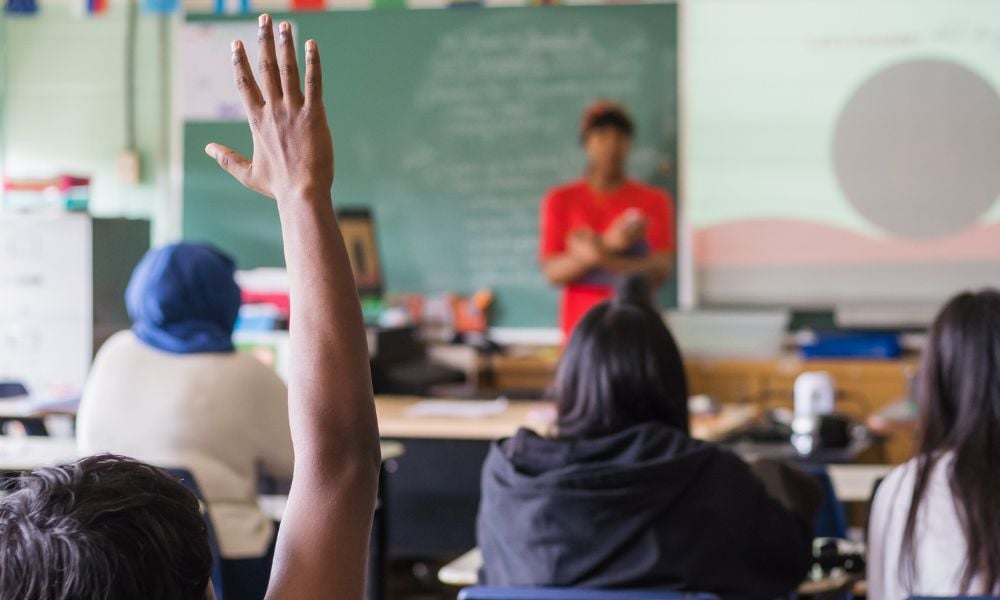
It is crucial to support students’ legal literacy, argues Shelan Markus at Level Justice

A remarkable surge of youth activism is transforming our country's social justice landscape, with young people championing causes from climate change to racial justice to human rights. This trend highlights an urgent need to enhance public legal education for students, beginning in grade 4 and extending through high school. This is a pivotal stage of brain development, emotional regulation, and the formation of identity and values.
Take events like the recent Grassy Narrows River Run in Toronto on September 18. This was a powerful demonstration advocating for environmental justice and Indigenous rights. More than 8,000 participants, including 100 members from the Grassy Narrows First Nation, marched to demand compensation for the ongoing mercury poisoning crisis affecting Grassy Narrows First Nation and to call for the protection of their land from further industrial threats. Youth from the Grassy Narrows First Nation, as well as young activists from various organizations, schools, and communities, played a significant role in the event’s central messaging to call for justice. Events like this illustrate the critical importance of early public legal education interventions.
Most of the youth I connect with through my work come from low-income and marginalized backgrounds and face systemic barriers that limit their access to justice. Legal representation is often financially out of reach for those living in poverty. The legal system can be daunting, especially for individuals with limited education or resources. Rural and remote communities, particularly remote Indigenous communities, face significant obstacles in accessing legal services, exacerbated by systemic bias and discrimination. Many impoverished individuals are unaware of their legal rights or how to seek legal assistance.
Public legal education is a vital gateway for low-income and marginalized youth to become informed about their rights and how to exercise them. This education can also spark interest in legal careers and build trust and hope within a justice system that has historically fallen short of providing equitable access to justice. Integrating lawyer and law student-led public legal education programs into the educational system equips young people with knowledge of legal principles and inspires informed civic responsibility and youth activism. By doing so, we can support a generation of youth capable of understanding and shaping the law and society, who can also actively dismantle barriers to justice by fostering a legal sector characterized by empathy and humility.
Today’s young people aspire to be proactive advocates for change. They are eager to collaborate with governments, community leaders, institutions, and organizations. This reflects a clear demand for deeper engagement in social justice and public legal education. Incorporating these subjects into the educational curriculum is essential. Legal literacy is a fundamental life skill that can help people confidently advocate for positive change and navigate legal challenges.
Educators and legal professionals must adopt a proactive approach combining theoretical knowledge with real-life experience to effectively engage youth in public legal education. Experiential learning initiatives are crucial to allow students to step outside the classroom and into courtrooms, legal clinics, law firms, and law schools. This hands-on approach enhances legal capabilities and fosters an understanding of the law through experience. Public legal education should include opportunities for active engagement with legal concepts – through activities such as role-playing mock trials, interactive workshops, and simulated sentencing circles. Experiences like this help students apply their legal knowledge in realistic contexts, which fosters a sense of agency in navigating their rights and articulating their needs within the justice system.
Read next: Books for aspiring law students
Building relationships with the justice sector early on can facilitate profound change. Public legal education programs that enable interactions between practising legal professionals, law students, and youth living in marginalized conditions build trust between the justice sector and community members who often feel that the law does not serve their best interests. These programs could involve judges, lawyers, and law students sharing their expertise with young people, who could pose critical questions about the law, its impact on their communities, and the changes they envision. This exchange opens minds on both sides, which plays a role in moving towards people-centred and inclusive justice, as well as more innovative forms of justice that serve the needs of our diverse society. When people working within the justice sector listen to the social justice needs, aspirations, and inquiries of youth – particularly youth living in marginalized conditions – they can pave the way for a fairer, more efficient, and more equitable justice system.
Early public legal education incorporated into the educational curriculum provides a pathway for an informed and engaged cohort of youth who represent a powerful force for social change and a collective desire for a better future. When we expose young people to the possibilities available within the law, we do more than prepare future lawyers or lawmakers; we support an entire generation to be active participants in breaking down justice barriers in their lives and communities. The goal here is to build the capacity for young people to feel informed about their rights and use this knowledge as a transformative tool in their activism. Public legal education fosters a greater sense that youth have power within the justice system and that it’s a system that can be responsive to their needs rather than a mechanism for lawyers and judges to wield control over them.
It’s time for the legal profession and education institutions to realize their role and responsibility in developing this public legal education opportunity.